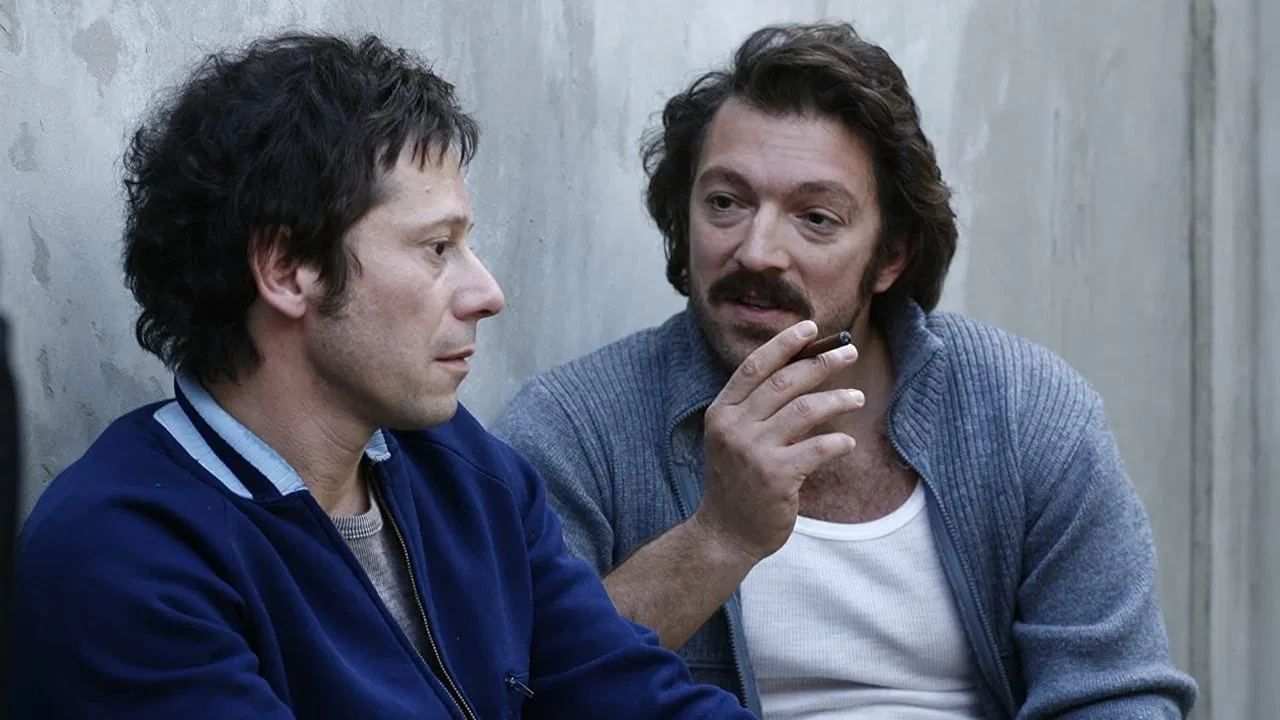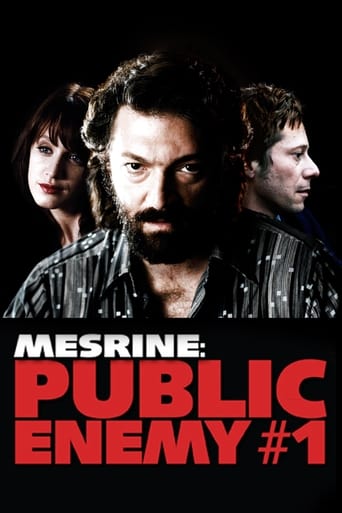

The story of Jacques Mesrine, France's public enemy No. 1 during the 1970s. After nearly two decades of legendary criminal feats - from multiple bank robberies and to prison breaks. Mesrine: Part II - Public Enemy #1 fixed some of the problems that Part 1 had for example this one is far more interesting sure there are some couple of pacing issues still but Vincent Cassel is way good for me to care about the pacing anymore. What i actually found disappointing was the ending i mean i understand what was going to happen but this was a guy that even cops feared and the way that he goes out was kinda humiliating but overall really great movie, great performances and a lot of good action. I'll give it an 7.5/10
... View MoreMost reviewers describe this movie as a "thriller" or "rise and fall" story, but how can a movie be described as such if there is no tangible plot or no rise and fall. I do not personally consider it a "rise" if the character's name is featured in some newspapers or a "fall" if the character is shot down down in a hail of bullets. This film is merely a look at the physical life of a criminal who got lucky. In reviewing this film I must go through both films as if they are one. So technically I will be reviewing a five-hour film. I will go into detail of the film. The film starts out with showing the main character, Mesrine, seemingly stalking a nervouse female. They then get into a car together and hit the road. Jacques lets a large blue truck get in front of him. They stop at a red light. The light turns green and then the back of the truck flies open with men aiming their guns at Mesrine. Title sequence. This scene is one of the best in the film. It is shot in the style of De Palma film with the meaningless splitscreen and suspense. After this, we get look at him as a young man in the Algierian army who is ordered to shoot a suspects wife, instead he shoots the suspect himself. Now this scene sets up the style of the movie: shaky-cam and in your face bloodshed. The rest of the movie (Part 1&2) can only be described in individual scenes. One great scene is where he meets his new partner, a bespectacled woman whose name escapes me, and immediately afterward they rob a mob-owned restaurant. The way this scene was almost unintentionally funny with the following exchange taking place: Woman: Leave him alone, he's mine. Jacques: Well it depends... Woman: On what? Jacques: Are you ready for anything? (well it went something like that.) After that exchange, they go rob a restaurant. Then we have the prison scene. This shows Mesrine at his absolute worse, where he cries, drools and begs for mercy. Of course he escapes and then comes back to save some friends. Then we get a shootout. End of part 1 The next part is basically a continuation of the last one and so this one only has few major scenes including his father dying and him escaping prison once more. Finally he dies. End of movie. The movie itself is merely competent. But it rides along in a steady pace and has great editing and directing from the director. And of course I have to mention Vincent Cassel's performance, which is great. Though, I must warn, the second half is kind of boring. End of review.
... View MorePublic Enemy Number One changes tacts in the 2009 double-bill chronicling notorious French gangster Jacques Mesrine, in that where the first was interested in detailing the rise and rise of the man, with hierarchy dominating the subject matter as well as the creating of his reputation; this edition is focused more on the tale of a gangster situated at the top of his game as well as the top of the state's hate list, hence the title, as an air of inevitability in dramatic decline begins to creep in. Cassel is back as Mesrine and playing him as the man whom ages into this somewhat grotesque, bearded, balding, overweight individual with delusions he's beaten mostly everyone up to this point and thus, is able to do mostly anything he wishes in winning any feud he instigates. The title refers to the name the state tagged onto him as Mesrine evaded capture; incarceration; thieved and terrorised to the point a 'shoot to kill' tactic had to be deployed. Since most of their primary methods were rendered futile due to the man's seeming invulnerability to being held down in a prison, a more blood thirsty tactic was forced into being deployed. As the state appear to step up their tactics and actions, Mesrine comes across as winding down as age and apparent psychological state catch up with him in that ideas of new plateaus such as politics and guerrilla warfare onto which he'll move begin to fill his head.If Killer Instinct was more to do with building a man up, this film is concerned with knocking him down; the first film allowing us to form our own opinion of him as he engaged in all this immoral activity but director Jean-François Richet refraining from painting an overly hateful image of him. When Mesrine appeared to engage in a violent act for the first time in Killer Instinct, it was against a pimp whom had beaten a woman up, rendering said fight against a sleazy; woman hating; sex industry working individual. Here, Richet drops us into an early instigation of violence as we observe Mesrine in a courthouse facing sentencing; but, and after a brief allusion to The Godfather, is soon shooting up police officers and taking a judge hostage as he escapes in what is a sequence of violence solely designed to turn us away from him as he does what he does; this, rather than paint an imbalanced portrait such as previously. Richet gradually veers us away from this figure of Mesrine, deliberately alienating us from him as the end nears, in savage beatings of hapless helpless journalists; the kidnapping and threatening of rich old men in their 80s for ransoms and a particularly gross montage right nearer the end in which Mesrine and fresh squeeze Sylvie Jeanjacquot (Sagnier) indulge in mass spending with ill-gotten money as wallowing in the purchasing of brand new cars and expensive diamonds gradually force us into turning on them.Director Richet paces this alienation wonderfully, only very gradually taking this character away from the audience before the inevitable comes to a hilt. If Killer Instinct was all about telling a story about a criminal flying all over the place and whose tales became dangerously entertaining and engaging as we wanted those around him, on several occasions, to fail in their apprehension; Public Enemy Number One is all about rendering Mesrine oafish and as if nothing more than a middle aged thug with a school playground mentality. When we begin, he's still up to his old tricks in robbing a bank before holding up another across the street for the thrill of it; in hiring a boxer he meets to act as the driver for another escapade, whom is apprehended before the plan can play out, and the consequent getaway which very nearly kills Mesrine and his second accomplice whom himself argues and walks away from Mesrine, we get the feeling the wheels are beginning to come off.Mesrine's chief criminal relationship is with another French criminal named François Besse, played by Mathieu Amalric. Besse is a quiet voice of reason amidst an inaccurate growing sense of invulnerability; the first night they break out of prison sees Mesrine bring over two women for sex and drugs, despite their faces being all over the news; whilst on another occasion, the venturing into a police station in disguise feels like a discerning act too far, and we relate to Besse as his facial expressions; tone and body language begin to mirror our own. Again, a sense of deliberate alienation creeps in on a number of occasions. The relationship hits a hilt when Besse questions Mesrine's mindset and philosophies, and the distinction between a man on a criminal ladder engaging in hierarchical struggle to that of someone veering more and more away from this life is established. Mesrine's admittance to this new existence and new found sense of life pushes him away from what it was he was in the first film, disobeying and betraying the demands of the genre; a rule breaking which costs him. While not as good as the first film detailing Mesrine's exploits, Public Enemy Number One offers an effective change of tact in covering the man's dangerous, brooding, cut and thrust life; culminating in a sequence which carries the lonesome air of inevitability as the packed, bustling Parisian streets act as the setting for the finale. As a matching set of engaging, powerhouse film-making; Richet's Mesrine double bill certainly delivers.
... View MoreNot having seen the first installment about the life of French criminal Jacques Mesrine, perhaps we are at a disadvantage. But recently, we caught the second part of the story in DVD format. The life and times of the man that was so resourceful in escaping captivity, gets a fabulous treatment at the hands of director Jean-Francois Trichet. The whole project owes a lot to the amazing performance by Vincent Cassel, not one of our favorite actors, but one has to recognize he made the whole picture enjoyable.Of course, we never even heard about the real Mesrine, but his life, the way it comes out in Abdel Raoul Dafri and the director's screen treatment is the stuff that made folk legends, much like the American gangsters in the period of the Great Depression. Unfortunately, not seeing the first part, there are things that are hard to comprehend by just watching the conclusion of the story, which is told documentary style.Vincent Cassel's take on Jacques Mesrine is what makes the viewer stay riveted to what is happening on the screen. Mr. Cassel has had his share of playing creeps before, but as Mesrines, he gives the performance of a lifetime. Mathieu Amalric appears as Francois Besse, the partner of Jacques' most daring escape from prison. Ludivigne Saigneur is seen as Silvia. Georges Wilson has a small pivotal role as the rich man Henri Lelievre, kidnapped by the two partners. Others in the large cast are the wonderful, but totally unrecognizable Oliver Gourmet, Gerard Lanvin, and Samuel Le Bihan in secondary roles.A lot of credit must be given to the amazing Robert Ganz cinematography and the careful editing by Bill Pankow and Herve Schneid. The music by Marco Beltrami and Marcus Trumpp adds a layer to the texture of the movie. One can understand the difficulty in making the film look real if one considers this is a story that happened more than thirty years ago. A lot of credit must go to the creator Jean-Francois Trichet for his achievement in recreating the story of a criminal that shook France during the time when he terrorized the country.
... View More